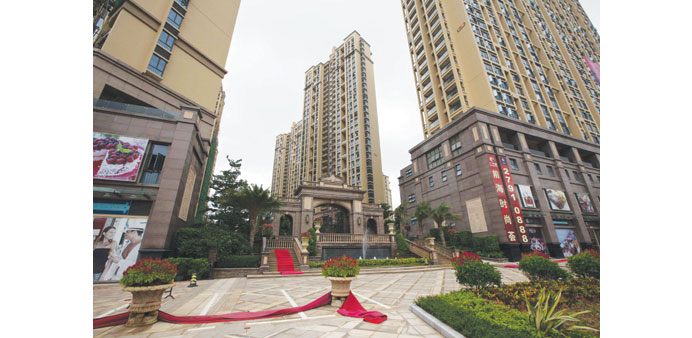New residential buildings for sale are seen near the Qianhai special economic zone in Shenzhen. As a slowdown hits China’s real-estate market, investors are turning bullish and buying up stocks of large property developers on bets they will not only ride out the storm but also grow bigger.
Dow Jones
Beijing
As a slowdown hits China’s real-estate market, investors are turning bullish and buying up stocks of large property developers on bets they will not only ride out the storm but also grow bigger.
The MSCI China Real Estate Index has surged 16.5% since the start of July, on track for its best month in nearly three years, as local governments have started to ease housing purchase restrictions to boost sales. The index still remains down 3.3% for the year though.
It is a sharp turn around on sentiment after a slowdown in the housing market sent property sales down 9.2% in the first half of the year and prices falling for a second month in June. The biggest pain though has gone to the smaller unlisted companies who are struggling as they are short of cash and mostly operating in smaller cities where oversupply is most severe. One unlisted developer defaulted in March and halted building.
By contrast, shares in some of the larger companies though have performed well with China Vanke Co, the country’s biggest developer, up 22.7% this year and another large builder, Evergrande Real Estate Group Ltd, climbing 17.2%. By contrast, the MSCI China Index is up 3.3% so far this year.
“The overall sentiment toward the property sector will be bad, because you will have these stand-alone developers running into liquidity problems,” said Patrick Ho, head of Asian equities at AMP Capital in Hong Kong, which manages assets worth 142bn Australian dollars ($133bn). But “the big will get bigger and get more brand loyalty.”
Ho bought developer stocks earlier this year on expectations that the industry, which has an estimated 85,000 companies involved in development, will consolidate a highly fragmented market. Already there are signs of that with the 10 largest Chinese developers boosting their share to 18.7% of national sales in the first half of 2014 from 14% at the end last year, according to Citi Research. The bank says that this share could reach 35% by 2020, and as much as 50% in China’s more developed first- and second-tier cities.
“Within a weaker backdrop, the bigger players tend to have an advantage winning over customers because of their longer operating track record and better brand recognition,” said Swee Ching Lim, credit research analyst at Western Asset Management Co with $468.7bn in assets under management. “They also have a leg up over the smaller players with more stable and diverse funding sources.”
Many economists say China’s current housing downturn poses the biggest risk to the economy because so many individuals have their wealth tied up in the sector, and it drives demand of items from metals to furniture. But local governments are responding, with those in Hohhot located in China’s Inner Mongolia region and the eastern city of Jinan among others easing home purchase restrictions to boost sales. The measures had been in place to prevent excess speculation after years of fast price gains.
“The stock reaction to the potential weakening has overshot the actual deterioration in fundamentals,” said Ronald Lee, associate portfolio manager at Cathay Conning Asset Management in Hong Kong. “Prices have only dropped by a few per cent so far, and the government is already loosening home purchasing restrictions.”
Lee, who helps his firm manage over $1bn worth of Asian equities, increased his exposure to Chinese developer stocks in the second quarter of this year.
Credit conditions for the housing market appear to be also improving. Banks issued more mortgages in June, and the central government has also allowed the launch of the country’s first mortgage-backed securities in seven years last week.
At the same time, fixed-income investors are pouring money back into bonds issued by Chinese property developers, fuelling rallies from 5% to 12% in the past two months. Some real-estate companies, like Sino-Ocean Land Holdings, are also issuing fresh debt. It sold $1.2bn worth of new bonds last week.
A key cause of concern is still the possibility of oversupply-especially in China’s less developed cities that have seen a ramp-up in building activity in recent years. The vacancy rate in four of China’s largest, most developed cities-including Shanghai and Beijing-is just 10% according to research from CLSA, compared with 16% in less-developed cities in the so-called second and third tiers.
As a result, many investors are avoiding real-estate firms with a focus on a particular part of the country. Khiem Do, head of Asian Multi-Asset at Baring Asset Management in Hong Kong, earlier this year increased his exposure to Chinese property companies, but bought developers he says were “national and more big-city oriented, rather than in the third-tier and lower cities because the oversupply there is quite serious.”
Do helps his firm manage $61.4bn worth of assets.

